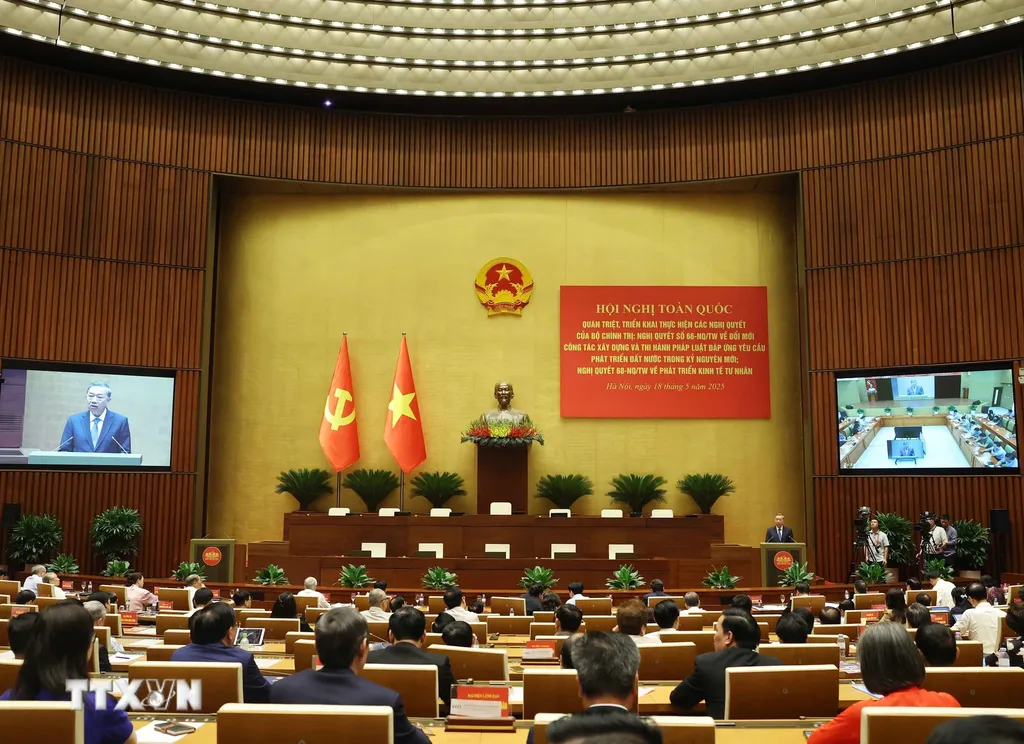 |
| Party chief To Lam makes a speech at the National conference on dissemination and implementation of Resolution 66 and Resolution 68 in Hanoi__Photo: VNA |
Resolution No. 66-NQ/TW, dated April 30, 2025, clearly outlines the need for a comprehensive reform of lawmaking and law enforcement to support national development in the new context. This document marks a significant shift—from a control-oriented legislative mindset to one focused on institutional innovation, aiming to build a legal system rooted in practical realities, capable of unlocking resources and transforming institutions and laws into a competitive advantage, a solid foundation, and a powerful driver of growth.
Orientations for legislative reform
To achieve the goals set forth in Resolution 66, Vietnam’s legislative reform requires well-defined strategic orientations in the years ahead. In an article published in Luật sư Việt Nam journal, Dr. Le Hung from the Ho Chi Minh National Academy of Politics proposed four strategic directions for effective implementation of the Resolution.
First, it is essential to ensure the effective realization of key quantitative goals set in the Resolution. These include removing legal bottlenecks by 2025, finalizing the legal framework for the operation of the state apparatus under the three-tier model by 2027, and establishing a business- and investment-friendly legal environment that would place Vietnam among the top three ASEAN countries for investment attractiveness by 2028. Achieving these objectives depends not only on coordinated efforts among state agencies but also on institutional implementation capacity and rigorous social oversight.
Second, a public, scientific, and effective oversight mechanism for the institutionalization of policies should be established. This is crucial to ensure that sound policy orientations set in the Resolution are transformed into enforceable legal instruments with real-world impact. It is essential to review the entire process—from policy formulation to the issuance of sub-law documents—to avoid situations where resolutions remain unimplemented or are institutionalized in a fragmented or incomplete manner. The delegation of oversight powers to the National Assembly, the Vietnam Fatherland Front, socio-political organizations, and the press can help ensure the practicality and effectiveness of implementation.
Third, the role of civil society, businesses, and academia in both lawmaking and oversight should be promoted. Modern legal systems should not be developed solely within the state apparatus but require meaningful, equal, and responsible participation from non-state actors. Encouraging and institutionalizing channels for policy feedback, public-private dialogue, and engagement with legal scholars will ensure laws are grounded in social reality. This approach will also transform the strength of civil society and the business community into a driving force for institutional reform, enhancing public trust in, and the legitimacy of, law-making decisions.
Fourth, state agencies should strike a balance between legal stability and adaptability. While a stable legal framework builds legal certainty and confidence for all actors, laws must also remain flexible to keep pace with real-world developments, especially in the context of innovation and digital transformation. Therefore, it is essential to build a legal framework based on core principles, while granting the Government and ministries sufficient authority to issue detailed regulations—within reasonable and controlled limits—to maintain responsiveness without arbitrariness.
Solutions for addressing practical difficulties
In practice, the legislative process still faces numerous challenges, including limited and unstable financial resources, fragmented technological infrastructure, ineffective inter-agency coordination, and a lack of strategic investment in legal personnel.
In an article published in Pháp luật Việt Nam newspaper, Dr. Tran Van Duy from the Ministry of Justice’s Department of Legal Dissemination, Education and Legal Aid offered several actionable recommendations to advance the strategic goals of Resolution 66.
One key proposal is to establish a stable and long-term financial mechanism dedicated to lawmaking. According to Dr. Duy, funding for legislative work should not be lumped into general recurrent expenditures of ministries and sectors but should be allocated separately under a medium-term budgetary plan. This would support systematic activities such as policy impact assessments, field studies, stakeholder consultations, expert engagement, and public forums.
Equally critical is the modernization of technical infrastructure. The expert advocates for investment in an open, integrated, and interoperable legal database system across state agencies. He also calls for a comprehensive e-legislation platform with modules for drafting, public consultation, policy appraisal, and impact evaluation. Artificial intelligence and big data analytics, he emphasizes, should be applied to enhance the quality and predictive power of the legislative process.
Regarding human capital, Dr. Duy stresses the need for special incentives for experts and officials engaged in legislative work. He recommends in-depth, continuous training programs in collaboration with domestic and international legal education institutions. He also proposes upgrading legislative research institutes and academies into regional centers for policy consultation.
Institutionally, coordination and accountability must be improved. It is necessary to designate clear lead agencies for each stage of the lawmaking process, from drafting to appraisal and review. Moreover, a mechanism for evaluating the efficiency of investment in legislative work should be established, based on the timeliness and quality of enacted documents.
In addition, Dr. Duy recommends expanding public participation and strengthening international cooperation. The use of digital platforms for public consultation, the digitalization of the legislative process, and the establishment of legal development funds are practical solutions.
Finally, legal communication should be treated as a strategic pillar in institutional reform. Designing modern, accessible communication programs—using social media and digital platforms—can raise public legal awareness, foster a culture of legal compliance, and encourage active participation by citizens and businesses in the policy-making process.- (VLLF)









